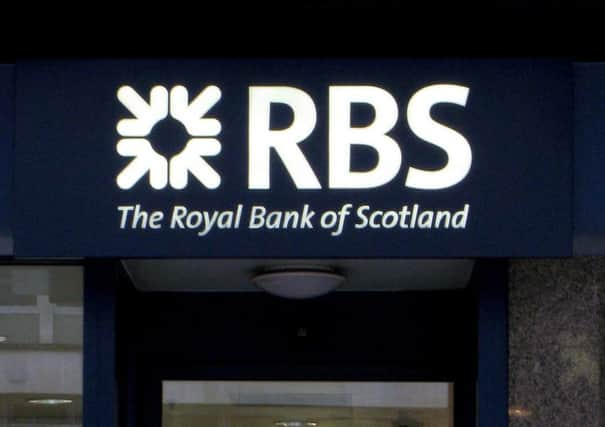Martyn McLaughlin: Damaging leaks require answers and redress on part of RBS


The opening salvo of Royal Bank of Scotland’s (RBS) description of its corporate values states that it is “focused on building a culture that puts our customers at the heart of our decision making.”
It would be instructive to conduct a straw poll of the thousands of the bank’s small business customers who had the misfortune to fall prey to its Global Restructuring Group (GRG). The likelihood is they would identify a gulf between its ambitions and its actions.
Advertisement
Hide AdAdvertisement
Hide AdThe tranche of leaked documents into GRG’s operations, published by the BBC and Buzzfeed, makes for chastening reading. They show that GRG’s staff could “provoke a default” where business customers had not defaulted on their loans, and bolster their bonuses by identifying firms which could be squeezed. In short, the bank stands accused of boosting its balance sheet at the expense of its customers, many of whom saw their livelihoods and families crumble as a consequence.
The fact that the RBS share price only teetered by 1.8 per cent in the wake of Monday’s leak was a reminder that these allegations are not new. Back in 2013, Lawrence Tomlinson’s report accused GRG of systematically wrecking viable businesses.
The resultant furore was tempered by the absence of what former business secretary Vince Cable referred to as a “smoking gun”. The latest leaks change everything, however.
The documents show that RBS customers could be transferred to the GRG division simply for falling out with the lender or beginning litigation. They also indicate that GRG, ignoring conflict of interest warnings, worked closely with RBS’s property division, West Register, to buy heavily discounted assets it had forced its customers to sell.
Perhaps the most damning details in the cache is the reference to the profit drive as ‘Project Dash for Cash’ and the ‘Blue Peter Cash Appeal’, proof that bankers are people that help you with problems you would not have had without them.
For its part, RBS has rejected the central allegation made by Mr Tomlinson and others, namely that it artificially distressed otherwise viable SME businesses or deliberately caused them to fail. In a clear cut case of nominative determinism, Jon Pain, the bank’s group head of conduct and regulatory affairs, gave an excruciating interview on Newsnight, where he repeatedly refused to even look at the evidence revealed by the leak.
The same day, RBS issued a statement stressing it had “seen nothing to support the latest allegations,” having been subject to “a number of investigations that involved a detailed review of all the evidence, including reviewing millions of pages of documents”.
The first point to make about the RBS statement is that there was not “a number of investigations” - there were two. Secondly, neither was as thorough as they could, or indeed should, have been.
Advertisement
Hide AdAdvertisement
Hide AdTake for instance the RBS-commissioned review conducted by Clifford Chance, which found no evidence of “systematic defrauding of business customers”. Even a fleeting examination of that probe shows it was about as robust as the RBS share price.
At the time of its publication in April 2014, RBS welcomed it as “thorough and independent”. It pointed out that the magic circle firm had interviewed 138 small business customers in what Mr Pain described as an “extensive” exercise.
Yet Clifford Chance’s diligence was not inexhaustible. The Manchester law firm, Berg, which is handling over 150 complaints from SMEs concerning GRG, offered to submit information to assist with the investigation. Clifford Chance declined the opportunity.
What is more, the review was overseen by none other than Mr Pain, a serving executive of the bank. According to the Treasury Select Committee, Clifford Chance’s work “was not independent” and was “based on narrow terms of reference”.
The other investigation the RBS statement alludes to - the Independent Lending Review by Sir Andrew Large - is barely worth mentioning, given the central allegation of the Tomlinson report was not investigated; Sir Andrew deemed that a “forensic inquiry into individual cases” was not within the scope of his investigation.
The only investigation that matters is the one that has yet to be published. Come January, three years will have passed since the Financial Conduct Authority (FCA) commissioned a report on GRG’s workings.
Its findings were expected last year, but a series of delays has pushed back the publication date time and again. The FCA received a final version of the report last week but it has said that it must take “a number of steps” before it can be released for public consumption.
Complex investigations of this scale take time, as well RBS knows. After all, until five years ago, Mr Pain worked as managing director of supervision at the Financial Services Authority, the FCA’s forerunner.
Advertisement
Hide AdAdvertisement
Hide AdLet us hope that his show of prevarication, so artfully demonstrated on national television, is the legacy of his transition from poacher to gamekeeper.
His former regulatory colleagues cannot afford to follow suit. The integrity of the FCA depends on it, as do the thousands of RBS customers seeking redress.
As for the bank itself? It says its culture has “come a long way over the last few years”. How it responds to the FCA’s report into GRG will give some indication of how much further it has to travel.